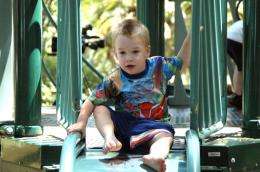Australia: Vaccine-resistant whooping cough takes epidemic to new level

A new strain of whooping cough that appears to be resistant to vaccination could take Australia’s four-year epidemic into a dangerous new phase, researchers have warned.
A team led by scientists at The University of New South Wales believes the emerging strain of the Bordetella pertussis bacterium may be evading the effects of the widely-prescribed acellular vaccine (ACV) and increasing the incidence of the potentially fatal respiratory illness, according to a study published in The Journal of Infectious Diseases.
The strain has been detected in other countries, suggesting it has the potential to spark epidemics elsewhere and should be closely monitored, the researchers say.
“The prolonged whooping cough epidemic in Australia that began during 2008 has been predominantly caused by the new genotype of B. pertussis,” said one of the study authors, Associate Professor Ruiting Lan, of the university’s School of Biotechnology and Biomolecular Sciences.
The strain was responsible for 31% of cases in the 10 years before the epidemic, but has accounted for 84% since – a nearly three-fold increase, indicating it has gained a selective advantage under the current vaccination regime.
“The vaccine is still the best way to reduce transmission of the disease and reduce cases, but it appears to be less effective against the new strain and immunity wanes more rapidly,“ said Professor Lan. Scientists would have to consider changes to the vaccine, or an increase to the number of boosters.
Last year Australia recorded about 38,000 cases of the life-threatening disease – the highest number since records began in 1991 – despite a relatively high rate of vaccination.
The authors said there had been a sharp increase in hospital admissions, especially of very young children who are not fully immunised.
Professor Lan’s laboratory team, led by postdoctoral research associate Dr Sophie Octavia, analysed almost 200 samples of the bacterium, collected from 2008 to 2010 in four states – NSW, Victoria, South Australia and Western Australia.
The team worked closely with researchers from the Centre for Infectious Diseases and Microbiology at Westmead Hospital in Sydney, the Women’s and Children’s Hospital in Adelaide, Princess Margaret Hospital for Children in Perth, and the Microbiological Diagnostic Unit Public Health Laboratory at The University of Melbourne.
The ACV vaccination replaced the whole-cell vaccine in 1997 over concerns about the latter’s side effects, which included fever and possibly febrile convulsions in young children.
Lyn Gilbert, a Professor in Medicine and Infectious Diseases at the University of Sydney, said there was a range of ways scientists might tackle the new strain of whooping cough.
“We could give vaccines earlier – to newborns, as long as it was done safely, we could try a combination of the old vaccine and the current one at different times, we could administer more boosters of the current vaccine, or we could try a whole new vaccine,” said Professor Gilbert, who is also Director of the Centre for Infectious Diseases and Microbiology-Public Health at Westmead Hospital.
“But a new vaccine is a big deal. And before we consider any options, we need more research to show for certain that the new strain is what’s causing the rise in serious cases, and we need extensive discussion within the scientific community and with relevant health bodies.”
There has been growing concern among public health officials about incidence of whooping cough in Australia. The death rate for babies under the age of six months who catch pertussis is one in 200, according to NSW Health, which says adults and adolescents are at particular risk of contracting the disease and can pass it on to babies who are too young to be immunized.
In NSW, vaccinations are routinely given to infants at two, four and six months. The first dose can be given as early as six weeks of age. Boosters are needed at age four and again in high school. NSW Health also recommends that new parents and carers of young infants receive boosters.
This story is published courtesy of the The Conversation (under Creative Commons-Attribution/No derivatives).















